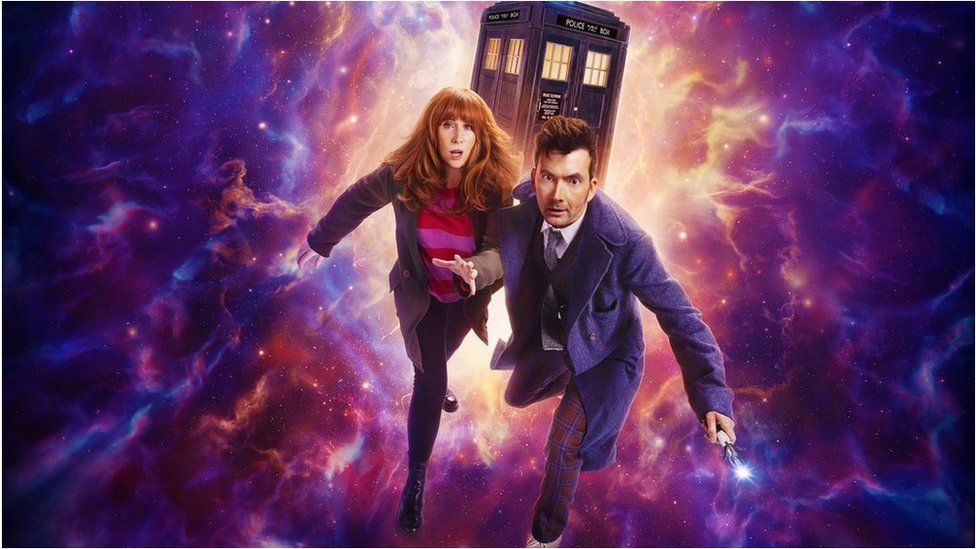BBC TV licence fee: How much is it and what does it pay for?
- Published

BBC director general Tim Davie has said the corporation will explore ways to reform the licence fee.
The government has already announced a review of the BBC's future funding.
How much is the BBC TV licence fee and what does it fund?
The TV licence fee is currently £159 a year (or £53.50 for black and white TV sets).
Money raised from the licence fee pays for BBC shows and services - including TV, radio, the BBC website, podcasts, iPlayer and apps.
There were 24.4 million licences in force in the year to March 2023.
From 1 April, the cost will go up by 6.6% to £169.50, after being frozen for two years. The increase is based on the inflation figure for September 2023.

The BBC's total income from the licence fee in 2023 was £3.74bn, which accounted for about 65% of the BBC's total income of £5.73bn.
However, if the licence fee had increased with annual inflation in every year of the past decade, the corporation would have received an extra £1.16bn in 2023.
The BBC's remaining income comes from commercial and other activities - such as grants, royalties and rental income.
In exchange for licence fee money, the BBC is committed to providing public service broadcasting.
According to its Royal Charter, this means its mission is "to act in the public interest" by providing "impartial, high-quality and distinctive" content, which will "inform, educate and entertain" everyone who pays the licence fee.
Why is the licence fee controversial?
The licence fee has been criticised for several reasons.
It is a flat-rate payment, which means that the poorest households pay as much as the richest.
The licence fee was introduced in 1946, when the BBC was the sole UK broadcaster.
However, it now competes not only with advertising-funded TV channels, but also online content such as YouTube and subscription services such as Netflix and Now TV.
Some people ask why they should be forced to pay for the BBC if it is a service they do not use.
Questions have also been raised about whether non-payment of the licence fee is a serious enough issue to merit criminal prosecution.
Is the licence fee under threat and what could replace it?
The licence fee's existence is guaranteed until 31 December 2027.
However, director general Tim Davie said it was right to ask questions about its future "in a world that is now full of choice".
In a speech in March 2024, he said the BBC would "proactively research how to reform the licence fee post-2028".
The process will include "looking at its scope, how it could be more progressive, and making sure its enforcement is fair and proportionate," Mr Davie said.
As part of this, the BBC will launch its "biggest-ever consultation" with the audience about the future shape of the organisation.
The corporation will also work closely with the review into BBC funding which the government launched in December 2023.
A number of alternative funding models have previously been suggested:
- a tax on broadband connections
- a government grant funded out of general taxation
- part-funding through advertising
- a subscription model
Who needs to pay for a TV licence?
By law, each household in the UK has to pay the licence fee - with some exemptions - if they:
- watch or record programmes as they're being shown live on any TV channel
- watch programmes live on any online TV service - for instance, Channel 4, YouTube, or Amazon Prime Video
- download or watch any BBC programmes on BBC iPlayer
The rules apply to any device on which a programme is viewed, including a TV, desktop or laptop computer, mobile phone, tablet or set-top box.
If you don't use BBC iPlayer, you do not need a licence to watch non-live programmes, or clips, on streaming services like Netflix or YouTube.
Since then, it has only funded a free licence for any household where someone of that age also receives the means-tested pension credit.
Anyone who is registered blind can get a 50% discount.
The BBC funded 947,000 free licences in 2022-23.
Customers struggling to pay can spread the cost across 12 months, under the Simple Payment Plan.
How many people are prosecuted for not paying the licence fee?
If you do not pay the licence fee, you can be taken to court.
In 2022, there were 40,220 convictions for licence fee evasion, with an average fine of £202.
You cannot be sent to prison for licence fee evasion, but you can be imprisoned for failing to pay the resulting fine.
The TV Licensing Annual Review 2022/2023 said 90% of households needing a licence had one.
In the 12 months to March 2023, officers visited 1,075,240 addresses and found just under 73,000 people watching live TV without a licence.
The review said £137m had been spent collecting the licence fee.
Culture Secretary Lucy Frazer said the question of enforcement for non-payment of the licence fee would be considered as part of the government review.
"I think that there are issues in relation to criminal prosecutions, especially for those people who are the most vulnerable," she told Times Radio.